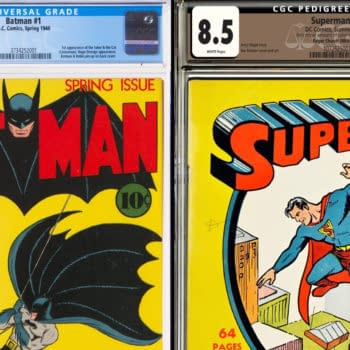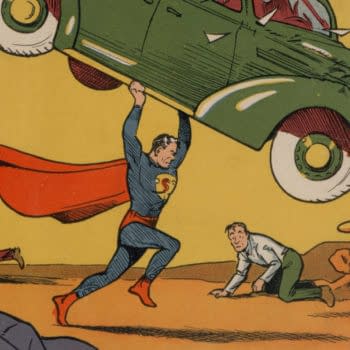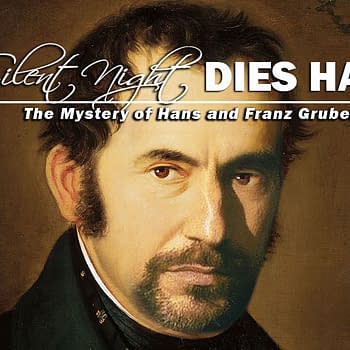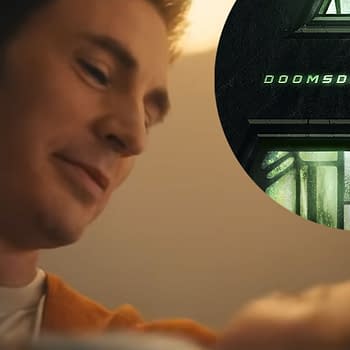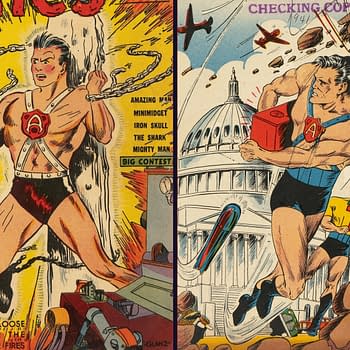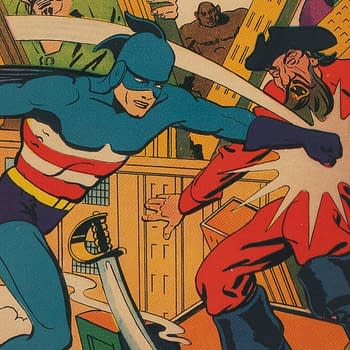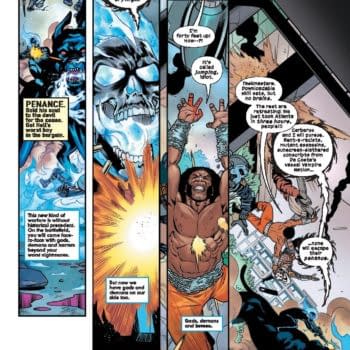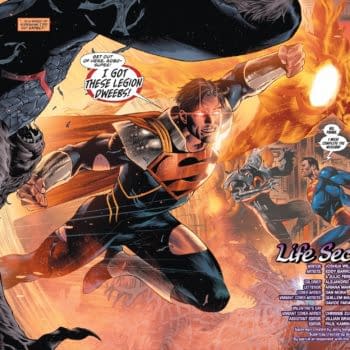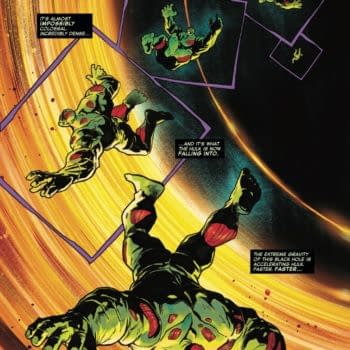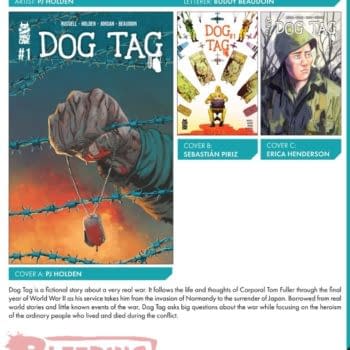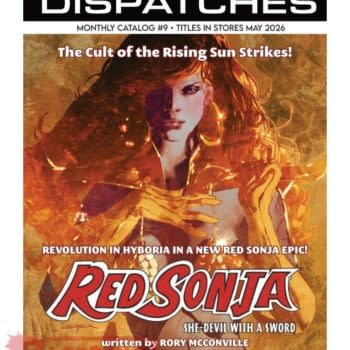Posted in: Comics | Tagged: axel alonso, cb cebulski, Comics, Declan Shalvey, entertainment, jim zub, jordan d. white, kris anka, marvel, sam humphries
SDCC 2014: Breaking Into Comics The Marvel Way Panel
By Joe Glass
Another comic con, another opportunity for Marvel to share with everyone the multiple paths of getting into this crazy industry of comics.
The panel was headed by Editor-in-Chief Axel Alonso and Marvel talent scout, CB Cebulski, along with a team of talent including Declan Shalvey (having just come off a successful stint on Moon Knight), Sam Humphries, Jordan D. White, Kris Anka and Jim Zub.
Cebulski starts by mentioning that in his time doing these panels, the methods of getting into comics have changed so much.
Alonso starts by explaining his first comics experience as a small child, and coming back into them at college. He never thought he'd wind up with a job in comics, let alone an EiC. Starting in journalism after a bachelor's in politics, he finally saw a job ad for editors at DC.
Amazingly, it was one of his political articles that had brought him to the attention to the EiC there at the time, and he remembered Alonso because of his unusual name. As Alonso puts it, he lucked into comics.
He did take elements of education which helped inform and understand his job in comics, such as art school, journalism etc, and he made clear the importance of all life experiences on influencing your work.
Zub explained how whilst people became aware of him in 2010 with his series Skullkickers, he'd actually been working in comics for 8 years, from art production, colorist and working his way up. It was from a pitch for his 2010 series that people started to think of him as a creator instead of an administrator, and his knowledge of production and management has served him well in the creative side of his career.
Humphries admits that he himself was in the audience for this panel three years ago, and he took Cebulski's advice to just make his own comics. During a bad year where it looked like he wouldn't make it, he made two self-published comics, including Our Love is Real, as a way to crash and burn spectacularly if it didn't work out but it would mean that he had at least MADE comics…and of course, from there things kicked off. He'd mailed copies of those comics to editors who he felt matched his sensibilities, namely Steve Wacker, who passed it on to Alonso, and was the impetus for Marvel to give him the call. The lesson he thinks is no one is going to give you permission to make comics, you should just make them.
Cebulski elaborates that when sending stuff in, send it in to editors you feel you know. Match your sensibilities to the work coming out under an editor, sending in a generic email/package well nlt endear you to an editor or company at all.
Shalvey brings in the UK point of view, again pointing out he was at this very same panel seven years ago. He started in small press, and his break came in when someone approached him saying he couldn't pay him, but if he drew his book, he'd get it printed. The man did just that, and Shalvey pointed out how that was so much better than just having a portfolio of work: this shows that you can make comics.
White, editor with a glorious mustache, says that anyone who makes it in comics makes it because they love working in comics. You use the skills from all the things you don't really want to be doing, but you can use that to make what you do want happen.
Cebulski brings it back is that its easier than ever to make comics now, but its harder than ever to get paid for it.
Alonso points out that as they came in, someone gave him and Cebulski a copy of their own self-published comics, and he points out this individual spent time and money to make this and may not be making any money off it, but it tells editors in comics that you can make comics. "Find a way to make it work"
Its then pointed out you can't send in one thing and then stop making anything waiting for the call…it's through continuing to work on your art that you improve, no matter the area you want to work in.
Anka has no idea how he got hired. Nick Lowe saw something in him, and during a break in college whilst working at Sideshow Collectibles, he had made a cover test and not heard anything. When going back to college, Lowe suddenly emailed him, and whilst Anka was busy with college, Lowe continually messaged Anka pushing for him to work more and more in comics. Anka says he owes it all to Nick Lowe not taking 'no' for an answer.
Zub reiterates how having an editor in your corner can really be the most helpful thing for you mzking your career, so building your contacts and relationships is vital.
To paraphrase Axel Alonso, the big things to be are be good, nice and/fast…combinations of the two could work, all three makes you're golden. Good and nice, they don't care if you're slow, they'll find the right project for you. You're good and fast, you have a little leeway to be an asshole. If you're nice and fast…well, they have schedules that need filling, so sometimes a mercenary mentality will work in your favor.
If you're professional, they will have your back.
Don't think when making your own comics that they have to be superhero comics, make anything you want to make.
Bring your passions to your work, no matter where or who you want to work for, this is more important to pandering to what you think they want.
"Write what you know, but know a lot," missed who said this, but Alonso picked up on it as its great advice.
For artists, don't just mimic the artists you love, according to Shalvey. If you love Coipel's work, Marvel already hire him, they don't need another one.
Questions and answers begin with the legality of sharing your ideas, but the best way is to get your ideas out there which proves when you came up with it. Make a website, make art, put it out there.
What's the next step for a writer after making a comic and exhibiting it?
ALONSO: Find an editor you like, see what material they're putting out there, and send it in to them. Don't saturation bomb them; you can, but it doesn't endear you to anyone. Give copies at cons, but be prepared to send more copies later too.
Make connections first too, it helps.
Best and worst advice about working in comics they received?
HUMPHRIES: A lot of people told him not to make Our Love is Real.
SHALVEY: was once told don't get too precious about your work, but Shalvey loves inking his own work, and he feels it makes his work stand out.
ZUB: he thinks a lot of creators want to make something perfectly fully formed, like the myth of Athena, but don't be afraid to make something imperfect, make it and move onto the next thing.
ALONSO: worst advice is when someone in a position of oower tells you there is one right way to make something.
From a New Zealand fan, are there any advantages to living in US?
ALONSO: not really, it can help, but there is nothing prohibitive not living in the USA now. Shalvey points out that him making such a major journey to the show really shows how serious you are about it, so it helps.
I've been to a few of these now, and personally I think thks has had some of the best advice yet of any one.
Joe Glass is the creator and writer of LGBTQ superhero series, The Pride, which is available at The Pride Store and on Comixology. He also co-writes horror comedy series, Stiffs (www.facebook.com/StiffsComic), which can be found the Stiffs Store (www.stiffs.bigcartel.com) and Comixology.
Hilton Collins adds his coverage of the panel:
Seven Marvel Comics creators kicked off their first Thursday morning panel at San Diego Comic-Con by giving a crowded room of attendees advice on how to join the comics industry in the panel, Marvel: Breaking into Comics the Marvel Way.
The consensus: There's no one path that leads you through Marvel's doorstep, or any other publisher's, but no matter which road you take, you'd better travel with passion and commitment.
Most beginning writers and artists, for example, should start creating their own comics to improve their storytelling skills as months and years pass, which takes patience, financial investment, and long-term dedication.
"You have to invest a lot of your own time and money into this to get to a place where you're going to be able to get paid for it," said talent scout C.B. Cebulski. "You do it for love first and the money will come. You have to take a chance. You're investing in yourself almost."
Editor-in-Chief Axel Alonso, editor Jordan D. White (Thunderbolts, All-New X-Men), artist Declan Shalvey (28 Days Later, Moon Knight), writer Jim Zub (Samurai Jack, Skullkickers, Figment), Sam Humphries (The Legendary Star Lord), and Kris Anka (Uncanny X-Men) joined Cebulski on the panel, comprising an impressive roster of talent that's produced work not just for Marvel, but also for DC, Image, IDW, Boom and other prominent American comic book publishers. Alonso compared them to big league players in sports, and aspiring creators must practice to reach that level and work on major characters.
"You don't walk in off the street and get Amazing Spider-Man. It just doesn't work that way. Take a look at any other profession. If you're a decent basketball player, there are steps you go through to get to the NBA. You don't just suddenly land there," Alonso said.
He's been impressed by people who've handed him self-published comics, which shows initiative and drive. If it's good enough to be read, it'll get the creator constructive feedback or a job.
They advised listeners to start making comics now so they can begin improving their craft sooner. "If you start making comics, they're probably terrible. You're going to need to get better, and when you're in a place where you want to show your work to Marvel and then they see a level of skill and craft, they'll appreciate it," Shalvey said. "If you're a writer, you need to write some bad stories, figure out why they're bad, [and] apply that to your work. If you're an artist and your perspective isn't good; you work on your perspective."
But ultimately, writers and artists shouldn't wait for others' approval to do their work before they start. A writer's a writer because he or she writes, and it's the same with visual artists.
People have a better chance of producing good work that impresses Marvel, however, if they're authentic. They should make the kinds of comics that excite them, and not just try to make the kinds of things that are trending or clone someone else's style. Shalvey mentioned, for example, that Marvel already hired superstar artist Olivier Coipel, so an up-and-coming artist shouldn't try to be the next Coipel; he or she should try to make art with an original style.
Self-publishing, the Internet, and social media have made it easier than ever tomarket work, get it seen, and break in — but even before modern technologychanged the game, there were still myriad ways to reach the Holy Grail of professional comics employment. Panelists shared their own stories of advancement, each of which was unique.
Some of their stories include:
• Humphries — who used to attend how to break into comics panels before he went pro — began pitching and writing short stories before he reached a dry spell where nothing he did was getting published. He got out of his "dead year" by self-publishing his own stuff, and one of his comics, Our Love is Real, about a cop who fell in love with his dog, got then-Marvel editor Stephen Wacker's attention about three or four years ago;
• Zub originally wanted to be an animator for movies and TV shows and had worked in some actual production studios before a friend who worked at Udon told him that the publisher needed more people. Zub joined Udon and held multiple positions during his time there before he wound up making work for Marvel as well as DC, Dynamite, IDW, and other big publishers;
• White said that his experience writing and producing radio serials in the past prepared him for the work he does at Marvel now as an editor, since it gave him skills in creating fictional, serial storylines. He decided to leave radio for comics and moved to New York City, the heart of American comics, starting interviewing for publishing, and eventually began the next phase of his career;
• Shalvey, who's originally from Ireland, became interested in comics sevenyears ago and started going to how-to panels at conventions. He started illustrating for small press publishers and worked his way into more andmore prominent companies, including working on the 28 Days Later comic for Boom, until he reached Marvel's offices;
• Alonso's professional background was in journalism, and he was a freelancer when he answered a help wanted ad in a newspaper from DC Comics for an editor position. In the interview, the hiring manager pulled out an article Alonzo had written about the use of the marijuana leaf in pop culture for the New York Daily News. The editor remembered Alonso's unique name from the byline and offered him the job, which Alonso took. He worked at DC for years before joining Marvel; and
• Anka's was studying animation when Marvel editor Nick Lowe contacted him to work for the company, and according to Anka, Lowe became his champion by consistently giving him comics projects over time, even at times when Anka seemed uninterested in taking them.
Cebulski told the audience members that, no matter what position they held in comics, they'd always wear different professional hats, either officially or unofficially. Working with artists turns writers into art directors, artists become sounding boards for writers, and there's a cross-pollination of duties and skills.
Breaking into Marvel and staying in should be pretty easy, however, if someone's professional. Employees in power positions are more likely to stick up for people who are talented, easy to work with, work quickly, or some combination of the three.
"If you're professional, you're more likely to have us watch your back," Alonso said.






